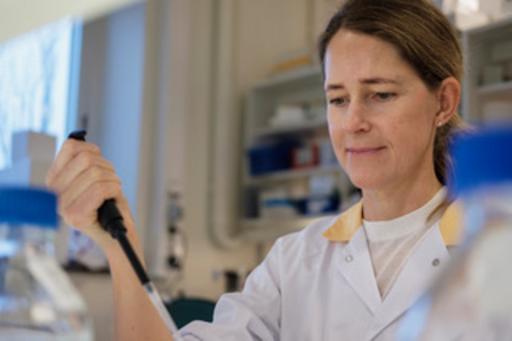Clinical and mechanistic studies of AIRE in rheumatoid arthritis
Short description
In rheumatoid arthritis (RA), activated pathogenic stromal cells, so-called fibroblast-like synoviocytes (FLS), in the joint act in concert with immune cells to drive chronic inflammation and destruction of tissue. About one hundred risk genes have been associated with RA and a quarter of these are upregulated in pathogenic FLS. We have shown that the transcription factor AIRE is one such gene and that it is expressed in the joint during the disease and promotes expression of interferon-regulated genes. AIRE plays an important role in the maturation of the immune system in the thymus where it counteracts autoimmunity. Its significance outside the thymus and especially in connective tissue cells in inflammation is largely unknown. A few studies, including ours, suggest that AIRE could be pro-inflammatory in the periphery.

Our overall goal is to increase knowledge of the molecular mechanisms that drive the pathogenic transformation of stromal cells in inflammation, and thus identify new targets for more effective treatment of RA. The aim of this project is to explore the significance of AIRE in RA by 1) mapping the expression of AIRE in the joint in RA in relation to clinical data and to controls, and 2) studying its function in FLS. Our hypothesis is that AIRE is induced in FLS in an inflammatory environment and in people with a certain genetic background, its expression leads to enhanced immune activation, chronic inflammation and joint destruction.
The research project studies blood, synovial fluid and cells from joint capsule tissue from RA patients and controls. The samples are collected after informed consent in connection with relapse of joint inflammation or during orthopedic surgery / arthroscopy. Expressions of AIRE and pro-inflammatory substances are measured in the samples by cell and molecular biology methods and analyzed in relation to clinical data. We also use genetic engineering to experimentally change the expression of AIRE in FLS and study the effects of it with different functional methods in the laboratory.
Still, only 40% of RA patients reach low disease activity on current immunomodulatory therapy. These treatments must be weighed against the risk of side effects such as infections. Novel therapy targeting activated stromal cells has the potential to increase efficacy, promote tissue reconstitution and improve safety for patients with RA and possibly many other chronic inflammatory diseases.
More information on the project can be found on Researchweb in the project database for FOU in the Västra Götaland region - project ID 266531